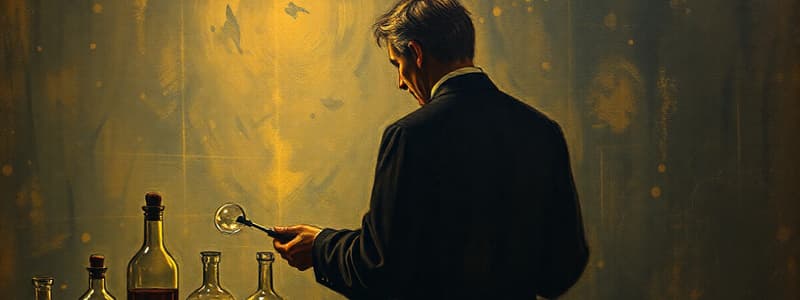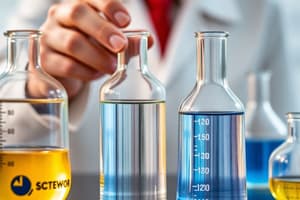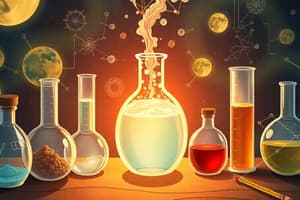Podcast
Questions and Answers
Which characteristic is most crucial for a well-designed scientific question?
Which characteristic is most crucial for a well-designed scientific question?
- It must be subjective and open to interpretation.
- It should be complex and involve multiple variables.
- It should explore broad topics with undefined parameters.
- It needs to be testable through data collection and analysis. (correct)
In a scientific experiment, what is the primary role of the independent variable?
In a scientific experiment, what is the primary role of the independent variable?
- To be manipulated or changed by the scientist to observe its effect. (correct)
- To remain constant and ensure the experiment's reliability.
- To be measured and observe any changes during the experiment.
- To act as a standard of comparison for experimental results.
Which of the following best describes the dependent variable in an experiment?
Which of the following best describes the dependent variable in an experiment?
- A variable that is kept constant throughout the experiment.
- A variable that is uncontrolled and may influence the experiment's outcome.
- The variable that is directly manipulated by the researcher.
- A variable that is measured to see if it is affected by the independent variable. (correct)
What is the purpose of controlled variables in a scientific experiment?
What is the purpose of controlled variables in a scientific experiment?
Within the scientific method, what term describes the systematic process of testing a hypothesis?
Within the scientific method, what term describes the systematic process of testing a hypothesis?
If a researcher wants to study the effect of fertilizer concentration on plant growth, what would be the independent variable?
If a researcher wants to study the effect of fertilizer concentration on plant growth, what would be the independent variable?
In the same experiment studying fertilizer concentration and plant growth, what would be the dependent variable?
In the same experiment studying fertilizer concentration and plant growth, what would be the dependent variable?
What is the main difference between a confounding variable and an extraneous variable?
What is the main difference between a confounding variable and an extraneous variable?
Why are controls important in scientific experiments?
Why are controls important in scientific experiments?
Which of the following is NOT a key characteristic of a good scientific question?
Which of the following is NOT a key characteristic of a good scientific question?
What distinguishes control variables from moderator variables in experimental design?
What distinguishes control variables from moderator variables in experimental design?
The primary goal of conducting experiments is to:
The primary goal of conducting experiments is to:
In an experimental setup, what is the fundamental role of the control group?
In an experimental setup, what is the fundamental role of the control group?
What is the defining characteristic of a test group in an experimental study?
What is the defining characteristic of a test group in an experimental study?
What is the primary purpose of including a positive control group in an experiment?
What is the primary purpose of including a positive control group in an experiment?
Why are negative control groups, such as placebo groups, crucial in experimental design?
Why are negative control groups, such as placebo groups, crucial in experimental design?
In the context of negative controls, what is a placebo?
In the context of negative controls, what is a placebo?
Which criterion is NOT essential for a well-designed scientific experiment?
Which criterion is NOT essential for a well-designed scientific experiment?
What was the significant discovery from Frederick Griffith's experiments?
What was the significant discovery from Frederick Griffith's experiments?
What was Oswald Avery's primary contribution to the understanding of genetic material?
What was Oswald Avery's primary contribution to the understanding of genetic material?
Flashcards
Verification Question
Verification Question
A question that can be tested through experimentation and observation, aiming to confirm a hypothesis or theory.
Theory Question
Theory Question
A question that aims to explore a complex topic, investigates existing theories or hypotheses, and seeks to understand underlying principles.
Experimental Question
Experimental Question
A question that can be tested through an experiment, designed to determine cause-and-effect relationships between specific variables.
Independent Variable
Independent Variable
Signup and view all the flashcards
Dependent Variable
Dependent Variable
Signup and view all the flashcards
Controlled Variables
Controlled Variables
Signup and view all the flashcards
Control
Control
Signup and view all the flashcards
Confounding Variables
Confounding Variables
Signup and view all the flashcards
Extraneous Variables
Extraneous Variables
Signup and view all the flashcards
Variable
Variable
Signup and view all the flashcards
Control variable
Control variable
Signup and view all the flashcards
Moderator variable
Moderator variable
Signup and view all the flashcards
Experiment
Experiment
Signup and view all the flashcards
Control group
Control group
Signup and view all the flashcards
Test group
Test group
Signup and view all the flashcards
Positive Control
Positive Control
Signup and view all the flashcards
Negative Control
Negative Control
Signup and view all the flashcards
Placebo
Placebo
Signup and view all the flashcards
Good Scientific Experiment
Good Scientific Experiment
Signup and view all the flashcards
Control for Multiple Variables
Control for Multiple Variables
Signup and view all the flashcards
Study Notes
Scientific Questions and Experiments
- Scientific questions are crucial for inquiry and learning, falling into verification, theory, or experimental categories.
- Good scientific questions are objective and testable, avoiding broadness that introduces numerous variables and answers.
- Questions focusing on independent and dependent variables are more easily understood.
- Data used to answer scientific questions can be measured or observed.
Scientific Experiments and the Scientific Method
- Scientific experiments are methods to study natural behaviors and structures.
- The scientific method, encompassing observations, measurement, experimentation, and hypothesis revision, guides these experiments.
- Experiments involve variables:
- Independent variables are changed by the researcher.
- Dependent variables are measured outcomes.
- Controlled variables remain constant.
- Controls are essential, establishing experiment validity.
Variables in Experiments
- Variables are aspects subject to change, manipulated, or measured.
- Key variables include:
- Independent variable (x-axis): Manipulated.
- Dependent variable (y-axis): Measured outcome.
- Other variables:
- Confounding variables: Unaccounted-for influencers.
- Extraneous variables: Factors that might contribute to dependent variable changes (e.g., demand characteristics, experimenter effect).
- Control variables: Kept constant for all.
- Moderator variables: Influence strength of relationship between independent and dependent variables (e.g., weight, height, health status).
Control Groups in Experiments
- Experiments typically involve at least one control group and one test group.
- The control group, composed of control subjects, serves as a comparison.
- The test group, composed of test subjects, receives a new treatment.
- Two types of control groups exist:
- Positive control groups receive a known treatment eliciting a response.
- Negative control groups receive no treatment; any response would be extraneous (often using a placebo).
- Negative controls help discern whether treatment is causing observed effects or other factors.
Designing Effective Scientific Experiments
- Scientific experiments need to answer a question, give objective results, and control multiple variables.
- Examples of good experimental design are shown by Griffith and Avery's experiments on bacterial transformation:
- Griffith discovered a transforming principle.
- Avery identified DNA as the transforming principle, methodically eliminating other variables to arrive at a precise, objective result.
Studying That Suits You
Use AI to generate personalized quizzes and flashcards to suit your learning preferences.
Description
Explore the fundamentals of scientific inquiry through this quiz. Learn about the importance of scientific questions, the scientific method, and the roles of various variables in experiments. Test your understanding of how to effectively conduct scientific experiments and analyze results.




